#andalusian literature
Explore tagged Tumblr posts
Text
Even the sky blazed on its stars to scan our love.
— HAFSA BINT AL-HAJJ AL-RUKUNIYYA ⚜️ Poems for the Millennium, Volume Four: The University of California Book of North African Literature, transl. by Abdullah al-Udhari, (2013)
#Amazigh#Andalusian#Hafsa bint al-Hajj al-Rukuniyya#Poems for the Millennium#Volume Four: The University of California Book of North African Literature#Abdullah al-Udhari#(2013)
14 notes
·
View notes
Text
Whose Todros is it anyway? A medieval Hebrew poet between Europe and Israel
🇪🇸 Todros Ben Yehudah Halevi Abulafia (1247- ca. 1295) fue un poeta hebreo medieval que vivió y escribió en Toledo, España, durante la segunda mitad del siglo XIII. Fue una figura única, ya que fue el único poeta judío de la corte del rey Alfonso X "el Sabio" que gozaba de su patrocinio directo, a quien dedicó varios poemas. Su vida se destacó por su asimilación en la sociedad cristiana, su amor por la vida disoluta y su fama como mujeriego. Abulafia fue un poeta en la diáspora, cuya poesía, influenciada por los trovadores cristianos de su tiempo, refleja tanto el estilo andalusí de los poetas hebreos como los gustos literarios de la España medieval. Tras la expulsión de los judíos en 1492, Abulafia quedó prácticamente olvidado en España, y fue redescubierto en el siglo XVII, cuando un escriba egipcio copió su diwan (colección de poemas), el cual pasó por varias manos antes de llegar al erudito David Yellin. La recepción de Abulafia varió según la perspectiva cultural, destacándose la controversia entre quienes lo consideraban un genio literario y quienes lo veían como un imitador mediocre. Su poesía ha sido estudiada por figuras como Moses Gaster, Saul Abdallah Yosef y Jefim Schirmann, quienes interpretaron su estilo cosmopolita y su relación con la cultura cristiana española de manera diferente, dependiendo de su propia relación con las culturas de la diáspora y la tierra natal.
🇺🇸 Todros Ben Yehudah Halevi Abulafia (1247- ca. 1295) was a medieval Hebrew poet who lived and wrote in Toledo, Spain, during the second half of the 13th century. He was unique in that he was the only Jewish poet at the court of King Alfonso X "the Wise", who directly patronized him and to whom he dedicated several poems. Abulafia's life was marked by his assimilation into Christian society, his love for a dissolute life, and his fame as a womanizer. A diasporic poet, his poetry, influenced by Christian troubadours of his time, reflects both the Andalusian style of Hebrew poets and the literary tastes of medieval Spain. After the 1492 expulsion of Jews, Abulafia was virtually forgotten in Spain and was rediscovered in the 17th century when an Egyptian scribe copied his diwan (collection of poems), which passed through several hands before reaching scholar David Yellin. Abulafia's reception varied depending on cultural perspectives, with some considering him a literary genius and others dismissing him as a mediocre imitator. His poetry has been studied by figures like Moses Gaster, Saul Abdallah Yosef, and Jefim Schirmann, who interpreted his cosmopolitan style and relationship with Christian Spanish culture differently, depending on their own relationship with diaspora and homeland cultures.
#Todros#Abulafia#Toledo#AlfonsoX#Medieval#Poetry#Diaspora#Hebrew#Spain#Andalusian#Trovadores#Culture#Literature#Jewish#Cosmopolitan#Tradition#Assimilation#Manuscript#Diwan#Poem#Scholar#judaísmo#judaism#judío#cultura judía#jumblr
4 notes
·
View notes
Text
"The Alchemist" by Paulo Coelho
I finished reading this last night before going to bed. This book was recommended to me by another blogger a few years ago and I finally got around to reading it. It’s not normally the kind of book I normally read but I took a chance reading it because I trusted the person who recommended it to me. The book follows a boy named Santiago who is ambitious enough to go travel so he starts off by…

View On WordPress
#25th Anniversary Edition#adventure#Andalusian#classics#dreams#fantasy#fiction#inspiring#Literature#magic#modern classic#mysticism#paperback#Paulo Coelho#philosophy#Santiago#self help#self-discovery#shepherd boy#spirituality#The Alchemist#travel#wisdom#wonder#worldy treasure
0 notes
Text
𝐒𝐈𝐍𝐂𝐄𝐑𝐄 - aitana bonmatí

aitana bonmatí x fem!lyon!reader
(a/n: had this sitting in my drafts since she won the ballon d'or, and I finally have a small break so enjoy luvvies (*^‿^*))
word count: 1243
genre: fluff
summary: an adorable aitana meetcute
On a breezy spring afternoon in Barcelona, the cosy bookshop cafe Letras Vivas buzzed with its usual charm. Tucked away on a quiet side street, a haven for readers and coffee lovers alike. The warm aroma of roasted beans mingled with the soft rustle of pages being turned and the occasional tinkling of laughter from patrons. The cafe was the kind of place where time seemed to slow, where strangers might strike up conversations over dog-eared novels or debate the best way to make a cortado.
You step inside, grateful for the reprieve from the city’s lively streets. The team had arrived in Barcelona a few days early to acclimate before the upcoming Champions League final. The pressure was immense – two giants of women’s football going head-to-head – but you had sought this little sanctuary for some peace. As much as you thrive on competition, moments like these were a way to offer clarity amidst the chaos.
Clad in a casual, well-worn shirt and a pair of faded jeans, you seemed a world away from the electrifying football star celebrated in the vibrant match posters that adorned the streets of Lyon. As you moved through the dimly lit bookstore, your fingers delicately glided over the spines of countless books lining the shelves near the entrance, occasionally pausing to absorb the titles that beckoned softly. Your gaze eventually landed on a novel, its cover a breathtaking watercolour that captured the charm of a seaside town, an irresistible pull urging you to pull it from the shelf and delve into its world.
At the counter, Aitana Bonmatí, FC Barcelona’s fiery midfielder, was already ordering her cappuccino. The barista seemed charmed by Aitana’s easy banter, her quick wit and warm laugh lighting up the space. She exuded the kind of confidence that came from knowing you were exactly where you belonged. The distinctive red-and-blue hoodie with Barça’s crest proudly displayed was casually slung over her shoulders, and drew occasional glances, but most were too polite to approach her.
As you approached the counter, Aitana turned, her grin wide and inviting, her hazel eyes bright with recognition. It took you a heartbeat to place her–you had seen that grin a hundred times before, from game footage to interviews to across the pitch. The face of Barcelona’s squad and one the most formidable centres in the game. And in just three days, your opponent. Once again.
Aitana didn’t miss the split second of hesitation that flickered across your face, and she seized the opportunity to break the ice with a playful energy. “Hey,” she said, her voice warm and laced with just a hint of mischief. “Nice to see you off the pitch.”
You blinked, caught slightly off guard but managing a smile. “Oh, uh, hi. Didn’t expect to run into you here.” Your Andalusian accent was unmistakable, and Aitana’s grin grew wider.
“You Lyon players just can’t resist the good spots, huh?” Aitana quipped, leaning casually against the counter. Her eyes flicked to the book in your hand. “Good choice. That’s one of my favourites.”
You raised an eyebrow, holding up the book. “Really? You’ve read it?”
Aitana’s eyes lit up with enthusiasm as she nodded, her ponytail swaying rhythmically with her head. “You won’t believe how captivating it is! It unfolds in this charming little fishing village—teeming with intense drama, sweeping love stories, and heart-wrenching heartbreak… it’s absolutely everything you could want! Imagine it like football, but infused with much more romance and way fewer tackles!”
A smile crept across your face as you placed the book on the counter, the rich aroma of freshly brewed coffee filling the air. “I’ll take your word for it, but relying on my opponent’s taste in literature? That feels like a risky move!”
“Oh, come on! Today, we’re not opponents at all!” The mischievous glint in Aitana’s eyes mirrored her playful smirk. “We’re just two enthusiasts who appreciate fine coffee and extraordinary tales.”
The barista expertly crafted Aitana’s cappuccino, the velvety foam adorned with an artful heart-shaped swirl that seemed to float above the cup. Instead of making a beeline for the door, Aitana lingered, her presence radiating warmth and curiosity as she patiently waited for you to finish your order, the air around you charged with an electric sense of connection. When you joined her at a nearby table, your conversation flowed with surprising ease.
Listening intently, as Aitana, ever the local, effortlessly wove stories about her childhood in Vilanova. Her voice softened as she talked about watching games at Camp Nou as a kid, her dreams of one day playing on the same pitch now a reality. She pointed out a few must-visit spots within Barcelona, her favourite tapas bar tucked away in El Born and a rooftop terrace with breathtaking views of the city at sunset.
It was your turn to share, Aitana leaned in, intrigued as you painted a picture of life in France. Your voice gained a quiet pride as you described Lyon’s relentless training culture—the way it pushed everyone to their limits and brought out the best in them. The early morning drills in the pouring rain, late-night strategy sessions, and the camaraderie that came from working with some of the best players in the game.
“So you’re telling me you actually enjoy those gruelling training sessions? Compared to the easiness of Madrid?” The brunette questioned.
“It’s not about enjoying them, exactly.” You shrugged, your smile softening. “It’s about knowing they make me better. And there’s something fun about the discipline, the way it transforms you. Being at Real Madrid, I never had that.” You finished.
Aitana nodded thoughtfully, her playful demeanour giving way to a moment of genuine admiration. “I get that,” she said. “I think that’s why I love playing here—Barcelona’s always pushed me to be more, too.”
Her words hung between the two of you, a shared understanding unspoken but felt. Despite the teams they represented and the rivalry that defined them season after season. They were, at their core, not so different. For a moment, the looming match disappeared, replaced by the quiet connection of two people who understood what it meant to give everything to the sport they loved.
“So,” Aitana began, cradling her cup, her tone suddenly teasing, “how’s Lyon feeling about Saturday? Ready to lose?”
You leaned forward, a playful spark in your eyes. “Confident enough to say you’ll be the one losing.” you shot back. Your laughter mingled, drawing a few curious glances from other patrons, but neither of you seemed to care, bantering for what felt like hours.
As the sun began to dip, casting the cafe in a warm golden glow, you both reluctantly stood to leave. Outside, the streets buzzed with life, the distant hum of a guitar echoing from a nearby plaza.
At the door, Aitana paused, turning to you with a smile softer than her usual confident smirk. “You know,” she said, tucking a strand of hair behind her ear, “maybe after the match, we should grab a coffee again. No rivalries—just books and good company.”
You tilted your head, cheeks dimpling into a grin. “Deal. But only if Lyon wins.”
Aitana laughed, backing away towards the bustling street, her voice carrying over the noise. “We’ll see about that!”
As you walked in opposite directions, you felt a strange lightness—a fleeting connection sparked by chance, lingering even as you prepared to face her on one of the biggest stages in football.
#aitana bonmati#aitana bonmatí imagine#aitana bonmatí#woso imagine#woso x reader#woso one shot#woso fluff#woso fanfics#baeksqt writes
212 notes
·
View notes
Note
Yo, I saw your post about orientalism in relation to the "hollywood middle-east" tiktok!
How can a rando and university dropout get into and learn more about? Any literature or other content to recommend?
Hi!! Wow, you have no idea how you just pressed a button. I'll unleash 5+ years on you. And I'll even add for you open-sourced works that you can access as much as I can!
1. Videos
I often find this is the best medium nowadays to learn anything! I'll share with you some of the best that deal with the topic in different frames
• This is a video of Edward Said talking about his book, Orientalism. Said is the Palestinian- American critic who first introduced the term Orientalism, and is the father of postcolonial studies as a critical literary theory. In this book, you’ll find an in-depth analysis of the concept and a deconstruction of western stereotypes. It’s very simple and he explains everything in a very easy manner.
• How Islam Saved Western Civilization. A more than brilliant lecture by Professor Roy Casagranda. This, in my opinion, is one of the best lectures that gives credit to this great civilization, and takes you on a journey to understand where did it all start from.
• What’s better than a well-researched, general overview Crash Course about Islam by John Green? This is not necessarily on orientalism but for people to know more about the fundamental basis of Islam and its pillars. I love the whole playlist that they have done about the religion, so definitely refer to it if you're looking to understand more about the historical background! Also, I can’t possibly mention this Crash Course series without mentioning ... ↓
• The Medieval Islamicate World. Arguably my favourite CC video of all times. Hank Green gives you a great thorough depiction of the Islamic civilization when it rose. He also discusses the scientific and literary advancements that happened in that age, which most people have no clue about! And honestly, just his excitement while explaining the astrolabe. These two truly enlightened so many people with the videos they've made. Thanks, @sizzlingsandwichperfection-blog
2. Documentaries
• This is an AMAZING documentary called Reel Bad Arabs: How Hollywood Villifies A People by the genius American media critic Jack Shaheen. He literally analysed more than 1000 movies and handpicked some to showcase the terribly false stereotypes in western depiction of Arab/Muslim cultures. It's the best way to go into the subject, because you'll find him analysing works you're familiar with like Aladdin and all sorts.
• Spain’s Islamic Legacy. I cannot let this opportunity go to waste since one of my main scopes is studying feminist Andalusian history. There are literal gems to be known about this period of time, when religious coexistence is documented to have actually existed. This documentary offers a needed break from eurocentric perspectives, a great bird-view of the Islamic civilization in Europe and its remaining legacy (that western history tries so hard to erase).
• When the Moors Ruled in Europe. This is one of the richest documentaries that covers most of the veiled history of Al-Andalus (Muslim Spain). Bettany Hughes discusses some of the prominent rulers, the brilliance of architecture in the Arab Muslim world, their originality and contributions to poetry and music, their innovative inventions and scientific development, and lastly, La Reconquista; the eventual fall and erasure of this grand civilization by western rulers.
3. Books
• Rethinking Orientalism by Reina Lewis. Lewis brilliantly breaks the prevailing stereotype of the “Harem”, yk, this stupid thought westerns projected about arab women being shut inside one room, not allowed to go anywhere from it, enslaved and without liberty, just left there for the sexual desires of the male figures, subjugated and silenced. It's a great read because it also takes the account of five different women living in the middle east.
• Nocturnal Poetics by Ferial Ghazoul. A great comparative text to understand the influence and outreach of The Thousand and One Nights. She applies a modern critical methodology to explore this classic literary masterpiece.
• The Question of Palestine by Edward Said. Since it's absolutely relevant, this is a great book if you're looking to understand more about the Palestinian situation and a great way to actually see the perspective of Palestinians themselves, not what we think they think.
• Arab-American Women's Writing and Performance by S.S. Sabry. One of my favourite feminist dealings with the idea of the orient and how western depictions demeaned arab women by objectifying them and degrading them to objects of sexual desire, like Scheherazade's characterization: how she was made into a sensual seducer, but not the literate, brilliantly smart woman of wisdom she was in the eastern retellings. The book also discusses the idea of identity and people who live on the hyphen (between two cultures), which is a very crucial aspect to understand arabs who are born/living in western countries.
• The Story of the Moors in Spain by Stanley Lane-Poole. This is a great book if you're trying to understand the influence of Islamic culture on Europe. It debunks this idea that Muslims are senseless, barbaric people who needed "civilizing" and instead showcases their brilliant civilization that was much advanced than any of Europe in the time Europe was labelled by the Dark Ages. (btw, did you know that arabic was the language of knowledge at that time? Because anyone who was looking to study advanced sciences, maths, philosophy, astronomy etc, had to know arabic because arabic-speaking countries were the center of knowledge and scientific advancements. Insane, right!)
• Convivencia and Medieval Spain. This is a collection of essays that delve further into the idea of “Convivencia”, which is what we call for religious coexistence. There's one essay in particular that's great called Were Women Part of Convivencia? which debunks all false western stereotypical images of women being less in Islamic belief. It also highlights how arab women have always been extremely cultured and literate. (They practiced medicine, studied their desired subjects, were writers of poetry and prose when women in Europe couldn't even keep their surnames when they married.)
4. Novels / Epistolaries
• Granada by Radwa Ashour. This is one of my favourite novels of all time, because Ashour brilliantly showcases Andalusian history and documents the injustices and massacres that happened to Muslims then. It covers the cultural erasure of Granada, and is also a story of human connection and beautiful family dynamics that utterly touches your soul.
• Dreams of Trespass by Fatema Mernissi. This is wonderful short read written in autobiographical form. It deconstructs the idea of the Harem in a postcolonial feminist lens of the French colonization of Morocco.
• Scheherazade Goes West by Mernissi. Mernissi brilliantly showcases the sexualisation of female figures by western depictions. It's very telling, really, and a very important reference to understand how the west often depicts middle-eastern women by boxing them into either the erotic, sensual beings or the oppressed, black-veiled beings. It helps you understand the actual real image of arab women out there (who are not just muslims btw; christian, jew, atheist, etc women do exist, and they do count).
• Letters of Lady Mary Wortley Montagu. This is a feminist travel epistolary of a British woman which covers the misconceptions that western people, (specifically male travelers) had recorded and transmitted about the religion, traditions and treatment of women in Constantinople, Turkey. It is also a very insightful sapphic text that explores her own engagement with women there, which debunks the idea that there are no queer people in the middle east.
---------------------
With all of these, you'll get an insight about the real arab / islamic world. Not the one of fanaticism and barbarity that is often mediated, but the actual one that is based on the fundamental essences of peace, love, and acceptance.
#orientalism#literature#arab#middle east#islam#feminism#book recommendations#reference#documentary#western stereotypes#eurocentrism#queer#queer studies#gender studies#women studies#cultural studies#history#christianity#judaism#books#regulusrules recs#If you need more recs#or can’t access certain references#feel free to message me and I’ll help you out!#regulusrules answers
126 notes
·
View notes
Text

Henry Miller and Anaïs Nin, Paris Uncredited and Undated Photograph
August 14, 1932
Anais:
Don’t expect me to be sane anymore. Don’t let’s be sensible. It was a marriage at Louveciennes—you can’t dispute it. I came away with pieces of you sticking to me; I am walking about, swimming, in an ocean of blood, your Andalusian blood, distilled and poisonous. Everything I do and say and think relates back to the marriage...
Here I am back and still smouldering with passion, like wine smoking. Not a passion any longer for flesh, but a complete hunger for you, a devouring hunger. I read the paper about suicides and murders and I understand it all thoroughly. I feel murderous, suicidal. I feel somehow that it is a disgrace to do nothing, to just bide one’s time, to take it philosophically, to be sensible. Where has gone the time when men fought, killed, died for a glove, a glance, etc? (A victrola is playing that terrible aria from Madama Butterfly—"Some day he’ll come!“)
I still hear you singing in the kitchen—a sort of inharmonic, monotonous Cuban wail. I know you’re happy in the kitchen and the meal you’re cooking is the best meal we ever ate together. I know you would scald yourself and not complain. I feel the greatest peace and joy sitting in the dining room listening to you rustling about, your dress like the goddess Indra studded with a thousand eyes.
Anais, I only thought I loved you before; it was nothing like this certainty that’s in me now. Was all this so wonderful only because it was brief and stolen? Were we acting for each other, to each other? Was I less I, or more I, and you less or more you? Is it madness to believe that this could go on? When and where would the drab moments begin? I study you so much to discover the possible flaws, the weak points, the danger zones. I don’t find them—not any. That means I am in love, blind, blind. To be blind forever! (Now they’re singing "Heaven and Ocean” from La Gioconda.)
I picture you playing the records over and over—Hugo’s records. “Parlez moi d amour.” The double life, double taste, double joy and misery. How you must be furrowed and ploughed by it. I know all that, but I can’t do anything to prevent it. I wish indeed it were me who had to endure it. I know now your eyes are wide open. Certain things you will never believe anymore, certain gestures you will never repeat, certain sorrows, misgivings, you will never again experience. A kind of white criminal fervor in your tenderness and cruelty. Neither remorse nor vengeance, neither sorrow nor guilt. A living it out, with nothing to save you from the abysm but a high hope, a faith, a joy that you tasted, that you can repeat when you will.
All morning I was at my notes, ferreting through my life records, wondering where to begin, how to make a start, seeing not just another book before me but a life of books. But I don’t begin. The walls are completely bare—I had taken everything down before going to meet you. It is as though I had made ready to leave for good. The spots on the walls stand out—where our heads rested. While it thunders and lightnings I lie on the bed and go through wild dreams. We’re in Seville and then in Fez and then in Capri and then in Havana. We’re journeying constantly, but there is always a machine and books, and your body is always close to me and the look in your eyes never changes. People are saying we will be miserable, we will regret, but we are happy, we are laughing always, we are singing. We are talking Spanish and French and Arabic and Turkish. We are admitted everywhere and they strew our path with flowers.
I say this is a wild dream—but it is this dream I want to realize. Life and literature combined, love the dynamo, you with your chameleon’s soul giving me a thousand loves, being anchored always in no matter what storm, home wherever we are. In the mornings, continuing where we left off. Resurrection after resurrection. You asserting yourself, getting the rich varied life you desire; and the more you assert yourself the more you want me, need me. Your voice getting hoarser, deeper, your eyes blacker, your blood thicker, your body fuller. A voluptuous servility and tyrannical necessity. More cruel now than before—consciously, wilfully cruel. The insatiable delight of experience.
HVM
--
Everyone else seems to have the brakes on… I never feel the brakes. I overflow. And when I feel your excitement about life flaring, next to mine, then it makes me dizzy. - Anaïs Nin to Henry Miller, 1932
68 notes
·
View notes
Text
News from LHR
Latest news from S, via a resuscitated Lacroix (after those a bit creepy Xmas wishes):
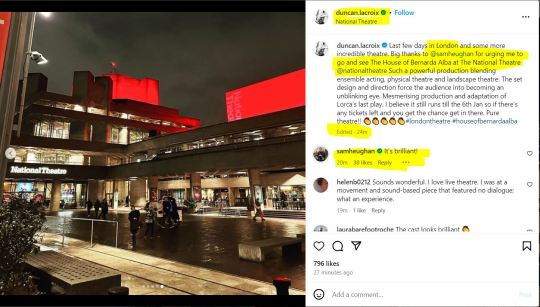
Mordor and especially its Knitting Club antenna will read with stupefaction the fact that The Boy went to see Lorca's House of Bernarda Alba at the Royal National Theatre, survived the experience, liked it and recommended it to his screen godfather and very old compay, IRL.
Because Moo's knowledge of Spanish literature probably ends with Corín Tellado (IYKYK, but for the rest of the world, that would be the nation's Barbara Cartland), I will just add my two cents on the matter and say, if memory serves:
This is, indeed, Lorca's last play and has a completely, shockingly feminist theme, dealing with a behind closed doors confrontation between an Andalusian matriarch (Bernarda Alba), her prophetic mother and her five daughters. Repressed feelings, social prejudice (this is, after all, Southern Spain in the Thirties), sexual tension, hidden love (Pepe, Angustias' love interest never appears on stage) and loss make it for a grandiose tragedy, not unlike the best Ancient Greek ones.
Not exactly what a peasant 'who does not read' (I 👀 everything you dare to write, Disgruntled Tumblrettes, and that was a very, very low blow - also hysterically funny coming from people like you) would enjoy seeing. And also something very appealing to the Sybil of Tydavnet - of that, I am very sure.
Color me intrigued. And yes, bitch around, Mordor. You can't stop this and you know it.
And yes, I would gladly see it, but alas it's on stage until January 6 only. I am particularly interested in the adaptation - just down my own alley & taste.
95 notes
·
View notes
Text
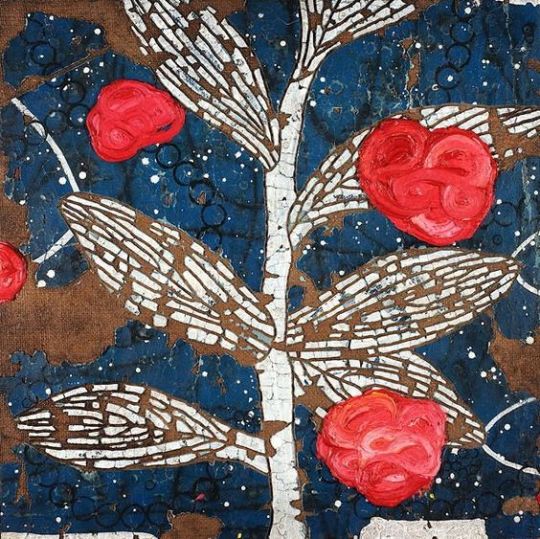
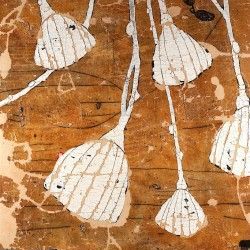
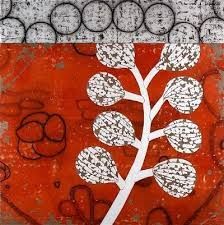
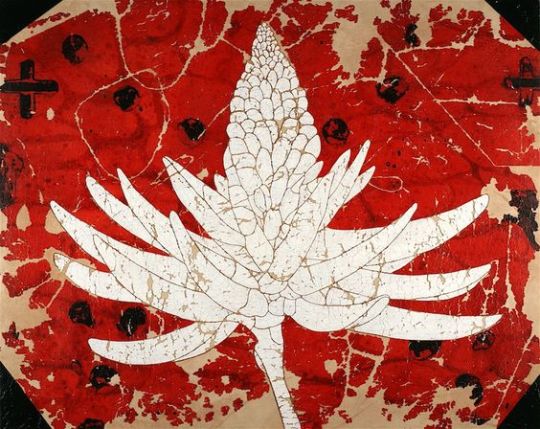
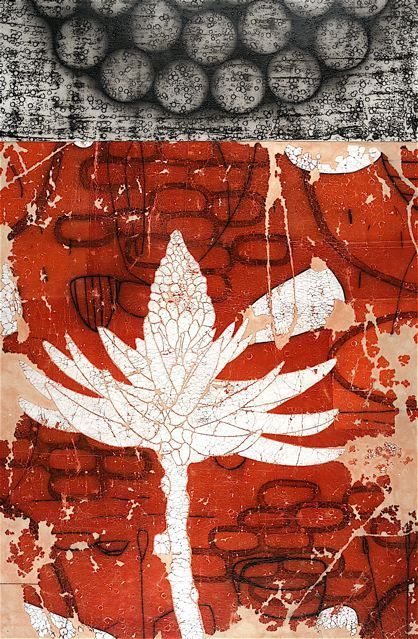
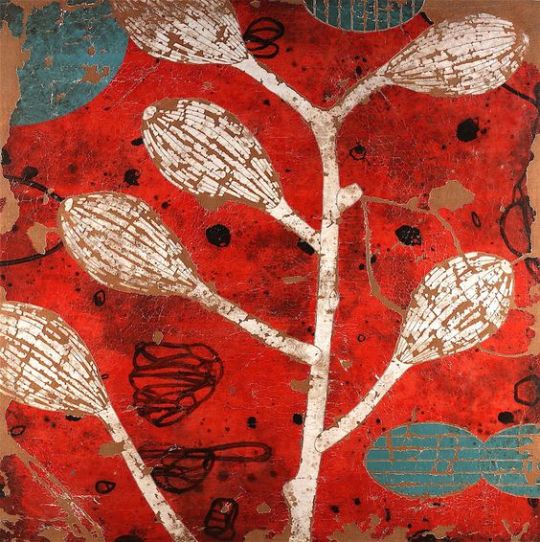
“Erik Gonzales was born 1973 in New Mexico and currently lives and works in Phoenix, Arizona, and Barcelona, Spain. He earned a BFA in Painting and Drawing from Arizona State University graduating Summa Cum Laude. He was awarded multiple Regents Scholarships during his attendance at university and continued his studies in Madrid, Spain obtaining a second degree in Spanish History and Literature.
His family’s Spanish background has had a profound influence on his work creating a dichotomy of new and old. On his paternal side, the family history can be traced back to 1564 in Northern Spain and France. His maternal family has its roots in Andalusia and came to the United States with a land grant from the King of Spain.
The analytical side of his work can be traced to his father whose pioneering career as a nuclear physicist introduced the artist to the world of science at an early age. The deep textures and bold use of color represent his mother’s Andalusian background and continues to influence his use of mystical imagery within his work.”
15 notes
·
View notes
Text
How the "Puss in Boots 2: The last wish" has a very important literature reference
Puss, even his fairytale is Italian, is a obvious reference of a Spanish character: the accent, the swordmaster, ... . But, in this movie, he also embodies a very important figure in the Spanish literature and folklore.
(if you want to know more keep reading)
First a small description of Puss and how he is shown in the begining of the movie. He is an hedonist who loves to drink, eat, flirt and duel without the fear of dying. He doesn't value the things of live and thinks he will live forever as a libertine (licentious).
The most licentious character in the literature is Don Juan.

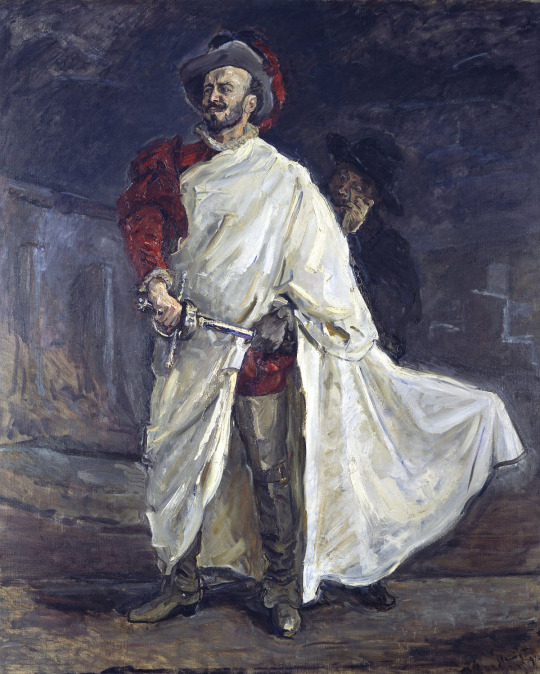
Even Don Juan is a well-known character, lets talk more abot him and why he is so similar to Puss (not only bc both of them are Andalusians).
Don Juan is not only a literature character from some plays and novels, he is a very popular legend in the Spanish folklore that has two origins in other two tales:
El burlador (The libertine)
El convidado de piedra (The stone guest)
The libertine
Don Juan is an hedonist, it is shown with his lust, gluttony, avarice and his desire for the duels and the scandal. If we notice Puss' deaths we can see this traits:

The flirtatious

The gambling


Gluttony
The 4th, 5th and 6th deaths are related of his pride.
Puss doesn't have the malice that Don Juan does, but the paralelism is obvious.
The Stone Guest
Following most of Don Juan's versions, he goes to the cementary where there is a funerary statue of the Comendador (Commander). He invites the statue to go to his home to have dinner with him in a act of vanity and malice. The statue accepts and joins him for dinner, he will be the one who bring Don Juan to Hell.
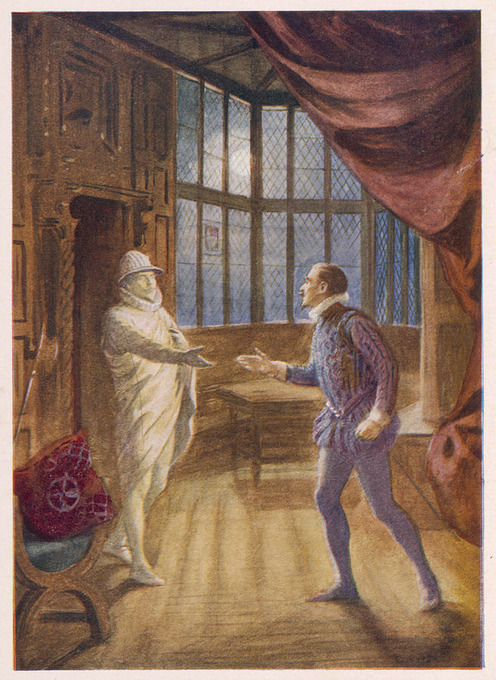
To see the conexion with the movie we have to go to the roots of this legend: the oral tradition of el Galán y la calavera (The Gallant and the Skull).
Here some fragments of this tradition (I won't translate this sorry)
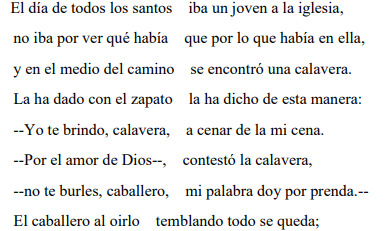
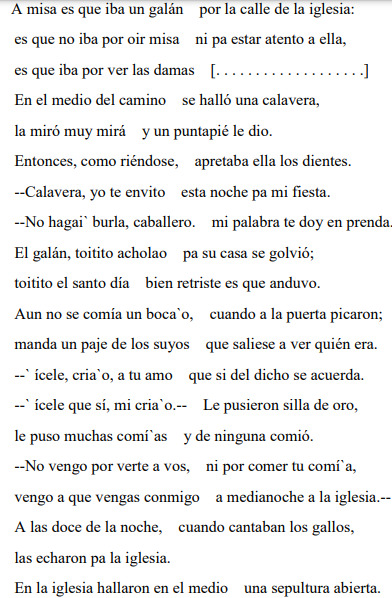
These are narrative poems who tells the story of a young man (libertine too) find a skull in his way. He invites the skull to join for a dinner with him while laughing. For his surprise the skull visits him that night and sits with him at the table joining for dinner. The skull didn't eat nor drink anything, but when the protagonist finish his meal, the skull invites him to join for dinner the next day at its/their home. The dinner would be at the grave, meaning that the Skull is Death itself (herself, bc in most Spanish literature Death is she)
This figure evolved into becoming the stone guest but the core is the same. Both, the Skull and the Stone guest are characters which the protagonist mocked and then reveal that they were Death itself.
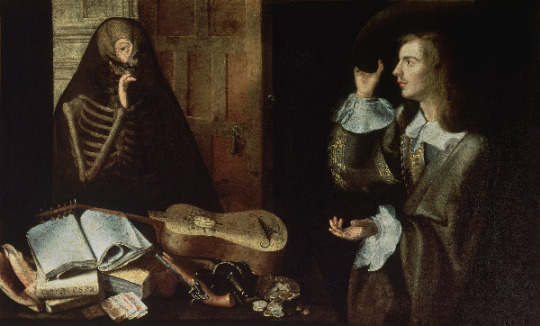
This scene makes it clear:
The last wish is more close to Zorrilla's version of Don Juan, Puss is saved from Death by the value he learned from his love (and friends).
It also has more references: The movie begins with the fuss Puss makes in the house of the Governor as most of the versions of Don Juan starts with him making fuss in the Comendador's house.
Sooo, here ends this post. I'm not very good at English but I hope you all enjoyed reading this.
#puss in boots#The last wish#Death#puss in boots wolf#Wolf#puss in boots death#Don Giovanni#Don Juan#literature#spanish literature#folklore#stone guest
281 notes
·
View notes
Text
my mum showed us this book they made showing some of my grandpa's work as a photographer for spanish singers and I wanted to share with you some of them <3 below I'll add a little description of the artist in case you don't know who they are

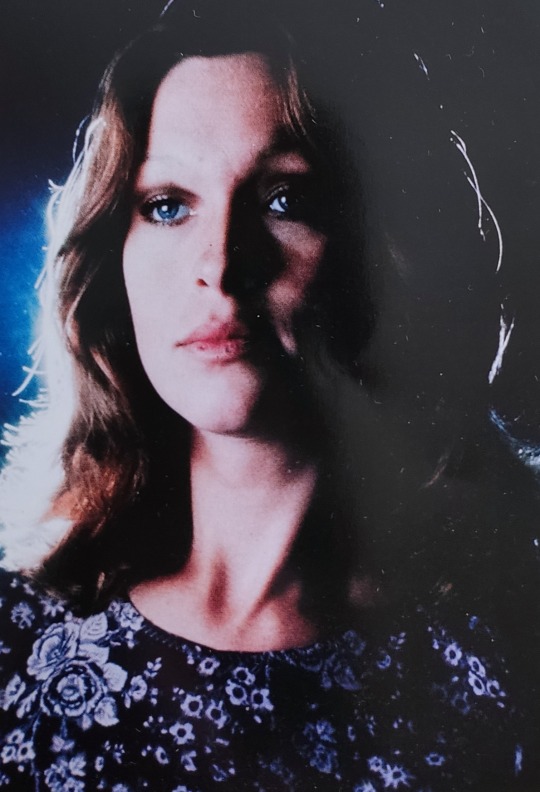



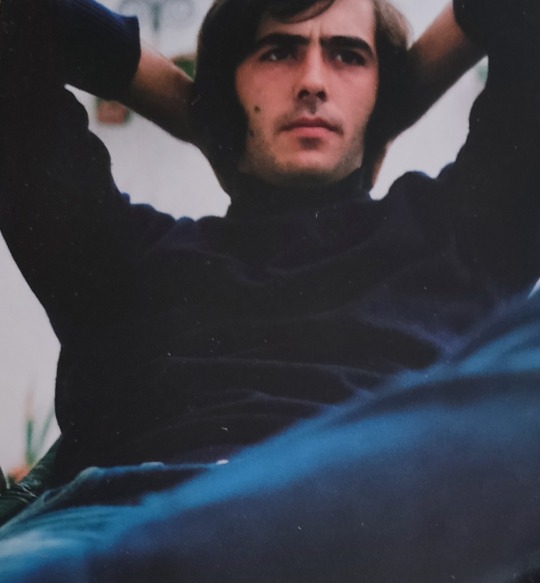
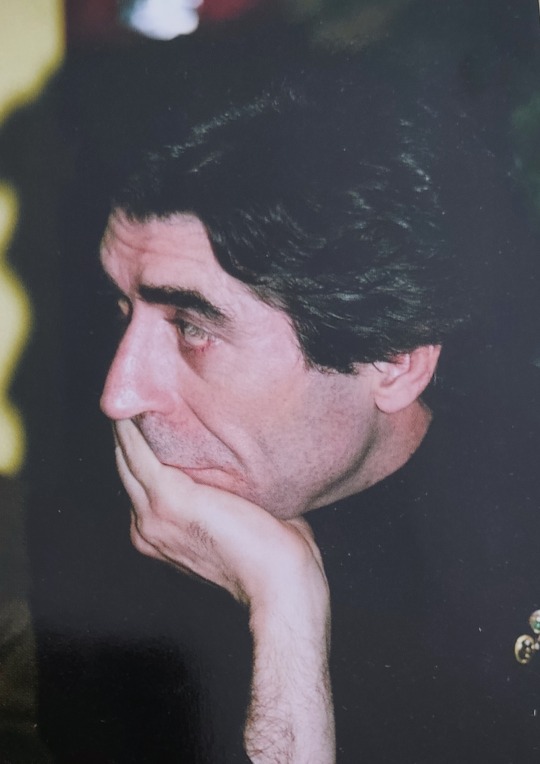
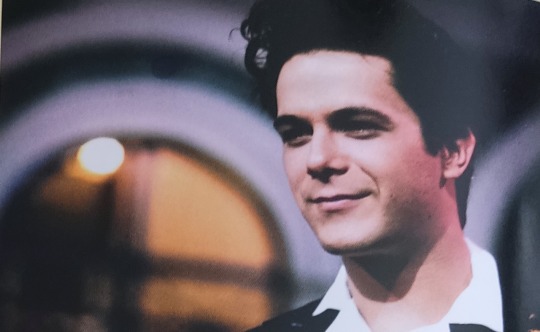
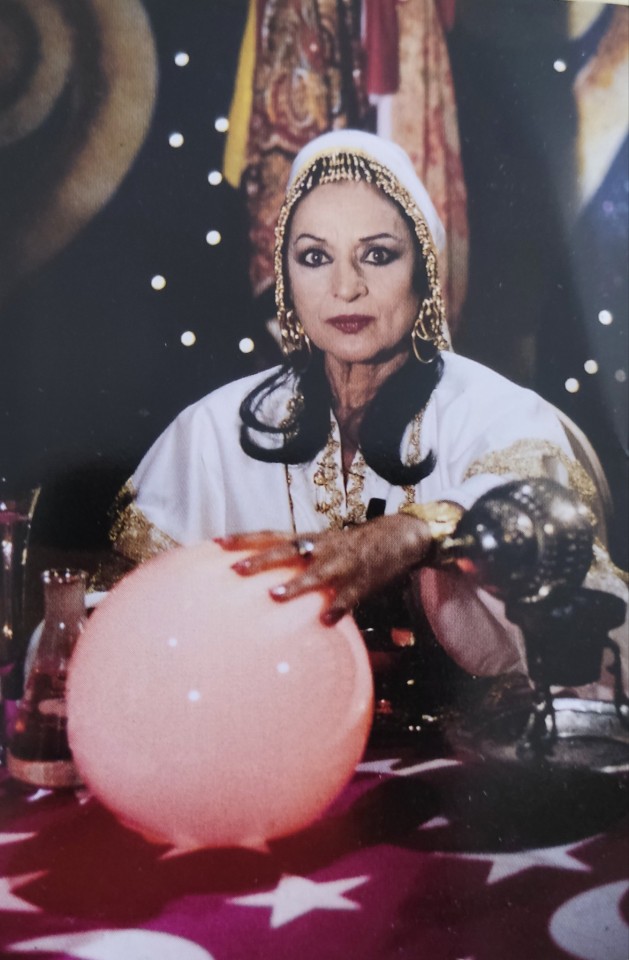
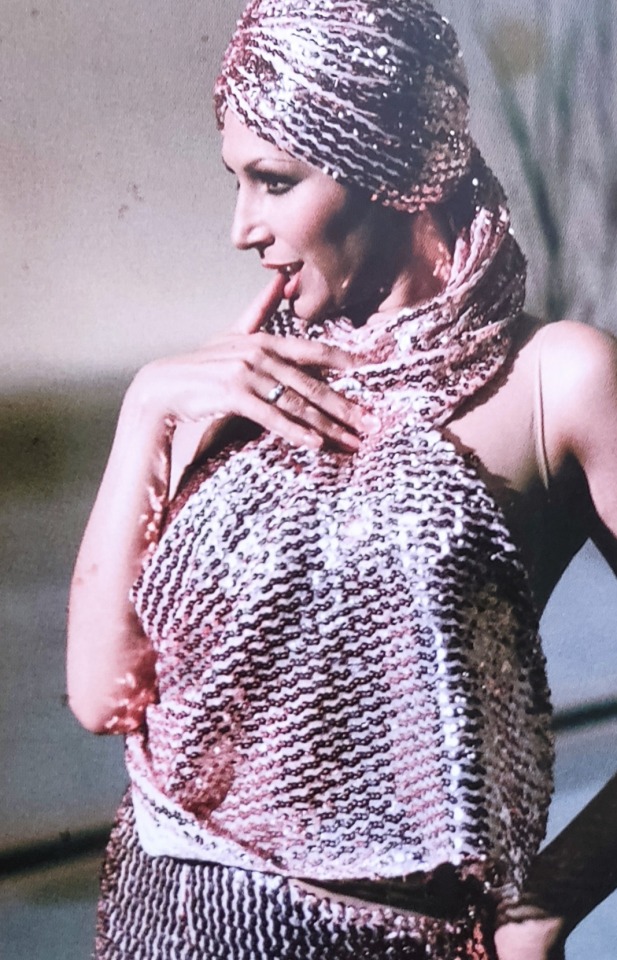
in order of appearance, they are:
massiel: she was the first spanish winner in eurovision in 1968 with 'la la la'. later in life she denounced the usage of the francoist regime of eurovision as a propaganda machine, and has remained vinculated to eurovision.
marisol: she was a child actress who suffered great abuse (as is usually the case) during her childhood and teenage years, working both as an actress and as a singer (she mostly starred - especially as a kid - in musical movies). she was also a member of the spanish communist party and has marxist ideas <3.
ana belén: she is one of the most iconic singers from the transition period (1975-1978) alongside her husband, víctor manuel (he was also photographied by my grandpa but i couldn't find a way his picture could fit). her songs have a strong social and political content, and she has also taken part in movies both as an actress and as a director. one of her most iconic songs is 'el hombre del piano', a spanish version of billy joel's piano man.
julio iglesias: he is perhaps one of the most successful spanish-speaking singers ever, having sold more than 150 million records. he is also part of the latin songwriters hall of fame. in 1983 he was celebrated for being the artist with songs in the most languages in the world, and in 2013 for being the best-selling male latin artist of all-time. oh and he has had a star in hollywood walk of fame since 1985, as well as having various grammys, latin grammys, billboard music awards, american music awards, etc. so yeah. he's a big deal (he's also the father of enrique iglesias who you might have already know). he represented spain in eurovision in 1970, with 'gwendolyne', which was his breakout hit.
nino bravo: he was one of the biggest spanish singers in the first half of the 70s, with massive hits and an incredible rise to fame that was tragically short, as he died in a car crash in 1973, when he was 28 (he only had 3 years of fame). my grandpa was a close friend of his, he even went to his wedding and appears in his memories. anyways, despite his short-lived fame, many of his songs are iconic and classics, possibly its best and most popular one is 'un beso y una flor', a karaoke classic.
joan manuel serrat: he is the singlemost imporant catalan singer-songwriter in history, with songs both in his native tongue and spanish (he's also my mother's favourite singer <3). he has a very poetic lyrical style, being influenced by poets like lorca, neruda, benedetti, machado, or alberti, and he even has some albums singing poetry of different spanish poets (the miguel hernández one is insane). he was also the pioneer of the nova cançó catalan movement, and he has been galardonated with highest honors in spain, as well as receiving the honorary latin grammy in 2014. his song 'mediterráneo' is for many - including myself - quite possibly the best spanish song ever (at least lyrically).
joaquín sabina: he is like a friend to me. my parents love him so they would always play his songs in long car rides and now i also love him his songs are incredible. he's actually a good friend of serrat and have toured together, their styles are similar only sabina isn't catalan (he's andalusian but lives in madrid) and his songs are more like stories than poems, he is inspired in baroque literature more than 20th century poets like serrat. just like serrat, he also has honorary awards by the ondas awards, the latin grammys, and various cities and regions in spain. it is literally impossible to choose only one of his songs to showcase here, but i'm afraid i have to go with 'y nos dieron las diez', one of his most popular songs, a karaoke classic, and the song we scream the loudest on the car with my family.
alejandro sanz: he is the most recent of all these singers, and currently the most famous spanish male singer i would say, only second to rosalía. he has won 22 latin grammys and 4 grammys, and he's collabed with artists such as alicia keys, shakira, or marc anthony. he's huge is what i'm trying to say lol. his breakout hit was 'corazón partío', in 1997, that still remains one of his most popular songs.
lola flores: she is everything to me istg. anyways. lola flores was a flamenco singer, dancer, and actress, that remains as one of the best folclóricas in history. just so you know, folclóricas were basically flamenco divas, think of them like that. she was iconic as fuck, antifa, feminist, and funny as hell. she is, as the english wikipedia says, 'a spanish pop culture icon'. you might also know her grand-daughter, actress alba flores. her most well-known song is probably 'ay pena, penita, pena'.
rocío jurado: just like lola flores, she is one of the most iconic and best folclóricas in history. just as her, she was both a singer and an actress, and she is remembered for having one of the best voices ever; in fact, in the year 2000 she won the new york times' prize 'the voice of the millenium' for best female voice of the 20th century. she is also iconic and regarded almost like a minor goddess in flamenco circles (just like lola flores). her most well known song is the iconic 'como una ola'.
#spanish music#massiel#marisol#pepa flores#ana belén#julio iglesias#nino bravo#joan manuel serrat#serrat#joaquin sabina#sabina#alejandro sanz#lola flores#rocio jurado#there's more but for some reason tumblr is back to only letting me have 10 pics per publication#which is deeply stupid#anyways. hope you like these :)#my grandpa was the best <3
16 notes
·
View notes
Text
I keep you in my eyes until the world blows up.
— HAFSA BINT AL-HAJJ AL-RUKUNIYYA ⚜️ Poems for the Millennium, Volume Four: The University of California Book of North African Literature, transl. by Abdullah al-Udhari, (2013)
#Amazigh#Andalusian#Hafsa bint al-Hajj al-Rukuniyya#Poems for the Millennium#Volume Four: The University of California Book of North African Literature#Abdullah al-Udhari#(2013)#Oui chéri.
17 notes
·
View notes
Text
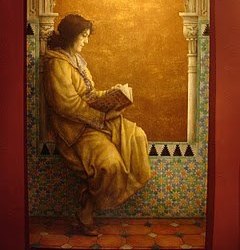
Hafsa bint al-Hajj al-Rakuniya (c.1135-1191)
She is perhaps one of the most celebrated Andalusian female poets of medieval Arabic literature. Her father was a wealthy Berber from Granada, so we may assume she grew up in luxury and received an excellent education. By the time the Almohads wrested the rule of Al-Andalus from the Almoravids, she had already started a love affair with the Governor’s secretary and her fellow poet Abu Ja'far Ahmad ibn Sa’id. From the evidence of both her poetry and his, it seems that she instigated the relationship and continued to visit him openly, despite the far stricter morality of the new Almohad rulers. Sometime around 1160, Abu Ja'far joined a rebellion against his employer, Abd al-Mu’min, governor of Granada. In 1163, he was captured and executed. Many knew and respected Hafsa as a teacher. Indeed, one of her colleagues described her as the most noteworthy teacher of her time. Her students were numerous and after the death of Abu Ja'far, she traveled widely. In the end she wound up in Marrakesh in Morocco, where the Almohad Caliph Abu Yusuf Yaqub al-Mansur engaged her to teach his daughters. She would remain there for the rest of her life.
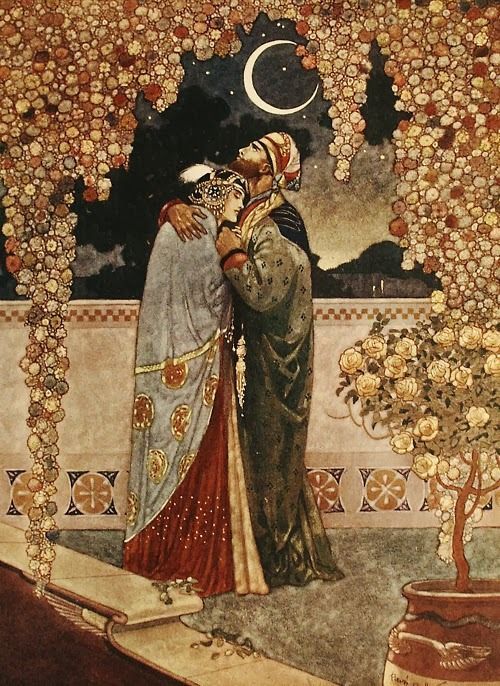
Hafsa fue hija de un noble de origen bereber, rico e influyente. Pasó su infancia y su juventud en Granada, en una época de agitación política intensa, que marcó la caída de la dinastía Almorávide y la instauración del califato de los Almohades. Por su talento y su cultura, así como por su belleza, pronto ocupó un lugar importante en la corte de los almohades de Granada, desarrollando una actividad literaria y educativa intensa y adquiriendo una reputación que llegó a traspasar los límites de Granada.
En este ambiente de la Corte y de la poesía granadina conoció al poeta Abu Yafar Ibn Said, perteneciente a la familia de los Banu Saíd, con el cual estableció una relación afectiva y pública hacia el año 1154. Esta relación dio lugar a un intenso intercambio de poemas amorosos entre los dos amantes, los cuales se han conservado hasta nuestros días. Así mismo, sus amoríos fueron cantados por los poetas de su entorno. Su situación se complica en el año 1156, en que llega a Granada Abu Saíd Utman, gobernador almohade, hijo del califa Abd al-Mumin, quien cae perdidamente enamorado de la poetisa. Oficialmente, Hafsa no cedió ante los sentimientos del gobernador, pero dejó morir su amor por Abu Yafar, quizás cansada de las veleidades afectuosas de este último o por las presiones del príncipe o de su familia. En 1158, es enviada a Rabat junto a un grupo de poetas y nobles granadinos ante el califa Abd al-Mumin. Fue éste quien le puso el sobrenombre de al-Rakuniyya (derivado de Rakuna, un tipo de salón literario).
Debido al conflictivo triángulo amoroso, Abu Yafar, quien había sido amigo y secretario del príncipe Abu Saíd, tomó a éste como objeto de sus poemas satíricos, y terminó tomando parte en una rebelión política contra el gobernador, dando lugar a su encarcelamiento y, finalmente, a su crucifixión en el año 1163, en Málaga. Hafsa lloró la prisión y la muerte de su amado, reflejándolo en unos versos punzantes y llegando hasta el extremo de vestir el hábito de viuda por él, a pesar de las amenazas del gobernador. Sumida en su tristeza, se retira de la Corte, abandonando la poesía y consangrándose en exclusiva a la enseñanza. Así vivió durante gran parte de su vida, hasta que en el año 1184, acepta la invitación del califa Abu Yusuf Yaqub al-Mansur quien la propone dirigir la educación de los príncipes almohades en Marrakesh, donde permaneció hasta el año de su muerte.
12 notes
·
View notes
Quote
From Salvador Dalí [Cadaqués, March 1932] Dear Luis, I’ve just received your letter, which I consider to be very serious indeed. I see you have completely abandoned all the ideas (surrealist) that we shared until now, and all for the sake of party discipline. I am surprised that the simple fact of joining the Communist Party should eliminate all vestiges of intelligence, even in individuals such as Aragon and yourself who (although no proof of this existed previously) might now be mistaken for the most elementary and infantile obscurantists. I am going to address in haste (because it would take ten more letters) the points in your letter that I regard as the most fundamental and the most monstrous. The most striking of which is your absolute lack of dialectic. You talk of your unspeakable plan to go on with the magazine as if nothing had happened, and to make it strictly surreal and experimental with no political articles (!); when it is not the communist articles the communists object to, but the strictly surrealist ones (the Kharkov resolution); in fact, the communist articles were introduced by the communist-surrealist faction. This all seems nonsensical to me, especially the unimaginable sentence with which you conclude your explanation that I cite here verbatim: ‘This approach may not be brilliant, but time will prove us right.’ No, this will never prove us right because surrealist experimentation is, and always will be (if genuine), regarded as very subversive by today’s society (that is to say, by the bourgeoisie), and as infinitely more subversive by today’s communists, as they are paving the way for a bourgeois state of mind and ideology that is far inferior in evolutionary terms. As for the films, I beg you not to undermine the gravity of this issue with yet another phrase that, again, is absolutely inexplicable coming from you: ‘Do not forgive their artistic errors.’ Artistic errors!! It’s not about those errors (which do exist). Those films, shitty proletarian literature, etc., etc., are polemical works, with entirely propagandistic ends; they are the faithful expression of the spirit and ideology to which they aspire; these are polemics that are not only permitted (PERMITTED) by the government but made by that same government. Those films and that literature are abominations, made in the spirit of ideological shit, on grubby mysticism, on veiled sanctity, etc., etc.. That was what made Aragon cry when he saw Earth, Dovzhenko’s infamous film, not its artistry, but its ideological content. It is all unforgiveable; we are not talking, therefore, about artistic errors (I for one will never forgive the indecent optimism of that poem ‘Red Front’, I find it shameful, poetically speaking. Poppies are red flags! It sounds Andalusian! It could almost, almost be Catalan!!!) However, the most unbelievable phrase in your letter is this one: ‘This new spirit of communism will reach future generations when the imperialist threat has passed, the dictatorship of the proletariat will come to an end with the disappearance of the social classes’. This phrase is exactly the kind of reformist fatalism in the realm of politics that you all (and rightly) used to hate so much; it is the equivalent of saying: ‘There is no need to protest now nor prepare for the revolution because communism will arise inevitably out of the development of history and inherent contradictions of capitalism’(!). ‘This is what the future generations will get’!!! This is your anti-dialectical reasoning when faced with the most transcendental and most human spiritual questions. As this new state of mind and morality is the inevitable consequence of social and economic revolution, we do not need to concern ourselves with them any longer. WHAT SHIT! Those of us who have defended ideological and spiritual subversion honestly demand intervention, violent, incessant and urgent intervention in this sphere, as in the political sphere, through the most effectively revolutionary actions. Historical materialism based on the constant assimilation of scientific evolution raises serious questions today: there are endless indications that this new obscurantism suggests that significant aspects of modern knowledge have not been incorporated into Marxism, nor into proletarian culture, and even that a significant amount of that knowledge has been brutally rejected. They do analyse with some objectivity the case for psychoanalysis as today’s Marxists perceive it. But it is truly shameful. There are some completely erroneous ideas in Marx and Engels (on love) that may have been due to shortcomings in scientific knowledge at the time, but that are still held today. These ideas have been subjected to absolutely no modification to date, in spite of the overwhelming existence of Freud. Had Marx, who appreciated as if it were his own the saying that ‘nothing human is alien to me’, and who turned even the meagre insights of his time to good effect when constructing his theories; had Marx known Freud, do you not think that he would have modified his timid theories of love? Everything is being violently rejected by the Stalins of today who are organizing the most chaste, most REPRESSED society in history: playing checkers (?); physical exercise and only the kinds of love they consider to be natural and healthy (!!). They are conjuring up the most horrendous form of spiritual slavery. The rejection of everything that seems to be subversive in modern natural sciences is the same as the rejection of surrealism, instead all efforts will be channelled into the creation, little by little (alongside the great and magnificent economic revolution) of a bourgeois spirit, starting with the current shit of proletarian art and eventually raising ‘future generations of ever more perfect spirit’. Juan Ramón Jiménez, for example, will surely be modified, but it will be for a more gentle Juan Ramón Jiménez, one that is less aggressive and more bourgeois as in the future communist society he will not have been influenced by our aggressive age of class and economic struggle. In your case and in Aragon’s, your absolute lack of appreciation for historical responsibility is monstrous. We may forgive the millions of revolutionaries who have no knowledge of surrealism, but in your case, you KNOW what surrealism represents for this age (particularly now, in the age of Russia’s moral brutalization): THE ONLY POSSIBLE FUTURE FOR THE WORLD, FOR THE SPIRIT, AND FOR TRULY SUBVERSIVE MORALITY, I say your attitude is unforgiveable for we have a unique historical mission that depends on our own activities and conscience. I know that you are both sincere people and that may well make it worse. With your new communist stance, you are as distant from me as Federico was when he published his Gypsy Ballads. All of this reflects a frightening spiritual weakness that makes me think you never felt surrealism as I did. Surrealism will be strengthened by this future split because it was being held back by that unfortunate political dilettantism, from now on we shall denounce all shit, even if it is proletarian. In fact, Aragon has not existed as a surrealist for a while now. And you have contributed nothing to surrealism, theoretically, despite my very high hopes of you. Surrealism is the only moral consolation left: you cannot imagine how strongly I condemn your attitude. Down with the bourgeois and reactionary optimism of the five-year plan! LONG LIVE SURREALISM! This time, I violently demand a reply from you: there are no legitimate excuses; you cannot leave me with no news again for three months. It is very important for our friendship. I await your immediate reply with all the candour and violence you think necessary. Regards, Dalí PS If we could talk, you would see that I am able to expand on and justify everything that I’ve just said here, because I am surrounded by notes and extremely well informed on all these matters, they are as familiar to me as to any communist. I’ve done nothing but read Marx (or ‘about Marxism’?) for the last three months. I am preparing a long article on what Marx called bestial love and modern sexual love, full of documentary evidence and enormously objective. In it, I conduct an extensive analysis of perversion as an essential characteristic and condition of human love in that it (perversion) presupposes the intervention in love of intelligence and imagination. What we call human love is in fact bestial: but I demonstrate all of this with reference to quotations well known to everyone and with a precise methodology.
Jo Evans & Breixo Viejo, Luis Buñuel: A Life in Letters
#jo evans#breixo viejo#luis bunuel: a life in letters#salvador dali#luis bunuel#louis aragon#aleksandr dovzhenko#karl marx#friedrich engels#sigmund freud#juan ramon jimenez
3 notes
·
View notes
Text
Exploring the Rich Tapestry of Arabic Culture: A Journey Through Language, Tradition, and Heritage
Arabic literature stands as a testament to the richness and diversity of Arab culture, spanning centuries of storytelling, poetry, and prose. From the epic tales of One Thousand and One Nights to the philosophical musings of Ibn Khaldun, Arabic literature offers a window into the complexities of Arab identity and heritage. Through themes of love, loss, heroism, and redemption, Arab writers have captured the essence of the human experience, resonating with audiences around the world.
The Arabic Language: A Bridge Across Borders
At the core of Arabic culture lies its language, a linguistic treasure trove with a history dating back millennia. Arabic is not just a means of communication but a symbol of cultural identity and unity for over 400 million speakers worldwide. With its intricate calligraphy and poetic beauty, Arabic script adorns everything from ancient manuscripts to modern street signs, reflecting the deep reverence for language in Arab society.
Tradition and Rituals: Preserving the Past, Celebrating the Present
Arabic learning programme is steeped in tradition, with rituals and ceremonies that pay homage to the past while celebrating the present. From elaborate wedding customs to religious observances such as Ramadan and Eid, every aspect of life in the Arab world is imbued with a sense of history and reverence for tradition. Family gatherings, communal meals, and storytelling sessions provide opportunities for connection and reflection, strengthening bonds across generations.
Calligraphy: The Art of Elegant Expression
Calligraphy holds a revered place in Arabic art, serving as a visual representation of beauty and spirituality. With its flowing curves and intricate details, Arabic calligraphy transforms written words into works of art, conveying both meaning and aesthetic appeal. From Quranic verses adorning mosque walls to ornate inscriptions on ceramics and textiles, calligraphy reflects the region's reverence for language and the written word.
Ceramics: From Ancient Traditions to Modern Innovations
Arabic ceramics are a testament to centuries of artistic skill and cultural exchange. From the vibrant tiles of Andalusian palaces to the delicate pottery of Ottoman workshops, Arabic ceramics showcase a rich tapestry of influences and techniques. Whether adorned with intricate geometric patterns or intricate floral motifs, ceramics serve as both functional objects and decorative masterpieces, adding beauty and sophistication to everyday life.
Textiles: Weaving Stories of Tradition and Identity
Arabic textiles are a reflection of the region's diverse cultural heritage and skilled craftsmanship. From luxurious silk fabrics to vibrant wool carpets, Arabic textiles are prized for their quality, beauty, and symbolism. Each textile tells a story of tradition and identity, with patterns, colours, and motifs reflecting local customs, beliefs, and historical events. Whether worn as garments or used as decorative accents, Arabic textiles are a celebration of artistry and cultural pride.

Filigree: The Art of Delicate Detailing
Filigree is a hallmark of Arabic metalwork, characterized by intricate patterns created from thin, delicate wires of precious metals. This technique requires precision and patience, as artisans meticulously weave and solder the wires together to form elaborate designs. From ornate jewelry to decorative objects, filigree adds a touch of elegance and sophistication to Arabic metalwork, showcasing the skill and artistry of the craftsmen.
Engraving: Etching Stories in Metal
Engraving is another technique used in Arabic metalwork to embellish surfaces with intricate designs and motifs. Using specialized tools such as chisels and gravers, artisans carve patterns and inscriptions into metal surfaces, creating intricate textures and reliefs. Whether adorning weapons, armour, or decorative items, engraved metalwork serves as a canvas for storytelling, with each mark and line conveying meaning and symbolism.
Inlay: Adding Depth and Dimension
Inlay is a technique that involves embedding one material into the surface of another to create decorative patterns and designs. In Arabic metalwork, this technique is often used to adorn objects with contrasting metals, gemstones, or enamel. Whether embellishing swords, shields, or ornamental boxes, inlay adds depth and dimension to metalwork, enhancing its visual appeal and creating a sense of luxury and opulence.
Innovation and Adaptation: Modern Applications of Traditional Techniques
While traditional techniques such as filigree, engraving, and inlay continue to be celebrated in Arabic metalwork, artisans also embrace innovation and adaptation to meet the demands of contemporary markets. Modern metalworkers incorporate new materials, technologies, and design elements into their creations, blending tradition with innovation to create works that resonate with today's audiences while honouring the legacy of the past.
Preserving a Time-Honoured Craft
Despite the challenges of globalization and mass production, Arabic metalwork remains a cherished tradition passed down through generations of artisans. Organizations and initiatives dedicated to preserving traditional crafts work tirelessly to safeguard the legacy of Arabic metalwork, providing training, resources, and support to aspiring craftsmen and women. By nurturing this time-honoured craft, they ensure that the artistry and beauty of Arabic metalwork continue to inspire and enchant audiences around the world.
Conclusion
As we journey through the rich tapestry of Arabic culture, we discover a world of diversity, complexity, and beauty. From the ancient traditions of the past to the dynamic innovations of the present, Arabic culture continues to evolve, enriching the lives of those who embrace it. By celebrating language, tradition, and heritage, we honour the timeless legacy of the Arab world and forge connections that transcend borders, bridging divides and fostering understanding in an increasingly interconnected world.
Arabic learning plays a pivotal role in this journey, opening doors to deeper insights and appreciation for the culture and traditions of the Arab world. Through Arabic learning, individuals gain access to the rich literary heritage of Arabic literature, delve into the nuances of Arabic poetry, and explore the intricate beauty of Arabic calligraphy. With each lesson, learners not only acquire language skills but also gain a deeper understanding of the history, values, and customs that shape Arabic culture.
By embracing Arabic learning, individuals forge meaningful connections with Arabic-speaking communities, fostering cross-cultural dialogue and mutual understanding. Whether through language exchange programs, online courses, or immersive experiences, Arabic learning enables individuals to engage with Arab culture in meaningful ways, breaking down barriers and building bridges of communication and empathy.
0 notes
Text
Mesopotamian heritage explored through the history of cooking

It was sometime in 1990 when Iraq was going through another wave of political and military turmoil under former president Saddam Hussein that Nawal Nasrallah, at the time a professor of English literature and linguistics, arrived on the East Coast of the United States.
As Dina Ezzat describes in the Egyptian weekly Al-Ahram, having a passion for the quality food that she had long enjoyed wherever she had lived in Iraq, Nasrallah, like many Arab expatriates, connected with her home country while abroad through its traditional recipes.
With the passing of time, Nasrallah’s cooking evolved from being a way to satisfy her homesickness to an incitement to do research about the history of these delightful meals, however, not just in terms of the evolution of the recipes, but also in terms of documenting the long history of Iraqi cuisine.
Eventually, she ended up being the translator of several ancient cookbooks, including classics from the 10th, 13th, and 14th centuries that offer a thorough insight into culinary culture, not just in Iraq but also in other countries that were once controlled by the mediaeval Abbasid Dynasty in Baghdad.
Published in 2003, another crucial moment in the modern history of Iraq, Nasrallah’s Delights from the Garden of Eden introduced Iraqi cuisine in both its past and present guise to a world that may have known more about Saddam’s political and military adventures.
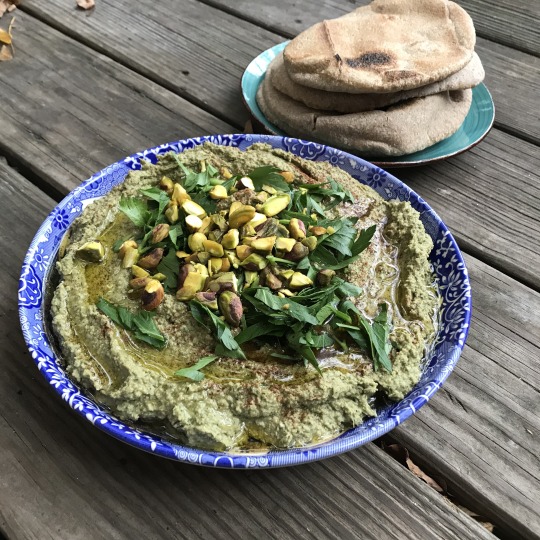
The title was the culmination of thorough research into the history of mediaeval Arab cuisine that had led Nasrallah to translate a 10th-century classic by Ibn Sayyar Al-Warraq called Kitab Al-Tabikh (Cookbook) that came out in English as Annals of the Caliphs’ Kitchens.
There were also her translations of the Best of Delectable Foods and Dishes from Al-Andalus and Al-Maghrib, a cookbook by the 13th-century Andalusian scholar Ibn Razin al-Tujibi, and the 14th-century Kenz Al-Fawaed fi Tanwia Al-Mawaed that came out under the English title of the Treasure Trove of Benefits and Variety at the Table: A Fourteenth-Century Egyptian Cookbook.
Nasrallah is keen to establish two facts about her work: first, that writing about the history of food is also a type of literature; and second, that a cookbook in the mediaeval context is not just a set of recipes but also includes nutritional facts, cooking techniques, and eating manners.
Through her work on the subject, Nasrallah said, it is not difficult to trace the uninterrupted thread of recipes from Mesopotamia, the Iraq of the Middle Ages, to modern Iraq today.
#manchester#iraq#iraqi#london#uk#baghdad#liverpool#scotland#hussein al-alak#usa#cooking#food#heritage#culture#history#museums#art history#learning#education#teachers#teaching
0 notes
Text
Best selling books of all time
Best Selling Books of All Time: Exploring Literary Legends
The list of best-selling books of all time is a testament to the enduring power of literature to captivate and inspire readers across generations. From timeless classics to contemporary masterpieces, these books have left an indelible mark on the literary landscape, resonating with millions of readers worldwide. Let's delve into the pages of some of the most beloved and commercially successful books ever written.
1. "Don Quixote" by Miguel de Cervantes
Topping the charts as one of the best-selling books of all time is Miguel de Cervantes' magnum opus, "Don Quixote." First published in two parts in 1605 and 1615, this iconic Spanish novel follows the adventures of the delusional yet endearing Don Quixote and his loyal squire, Sancho Panza, as they embark on a quest to revive chivalry and right the world's wrongs. Cervantes' masterpiece is celebrated for its rich satire, vivid characters, and profound exploration of the human condition, making it a perennial favorite among readers worldwide.
2. "A Tale of Two Cities" by Charles Dickens
Charles Dickens' "A Tale of Two Cities" stands as a timeless classic and one of the best-selling novels in history. Set against the tumultuous backdrop of the French Revolution, the novel intricately weaves together the lives of its characters, including the noble Charles Darnay, the enigmatic Sydney Carton, and the resilient Lucie Manette. With its stirring narrative, memorable characters, and poignant exploration of sacrifice and redemption, "A Tale of Two Cities" continues to captivate readers with its enduring themes of love, loyalty, and the pursuit of justice.
3. "The Lord of the Rings" by J.R.R. Tolkien
J.R.R. Tolkien's epic fantasy trilogy, "The Lord of the Rings," has enchanted readers since its publication in the mid-20th century. Comprising "The Fellowship of the Ring," "The Two Towers," and "The Return of the King," Tolkien's sprawling narrative transports readers to the enchanting world of Middle-earth, where hobbits, elves, dwarves, and men unite against the dark forces of Sauron. Filled with breathtaking landscapes, epic battles, and profound themes of friendship, courage, and the struggle against evil, "The Lord of the Rings" has become a cultural phenomenon, inspiring generations of readers and influencing countless works of literature and film.
4. "Harry Potter" Series by J.K. Rowling
No list of best-selling books would be complete without mentioning J.K. Rowling's beloved "Harry Potter" series. Chronicling the magical journey of a young wizard, Harry Potter, and his friends Hermione Granger and Ron Weasley, Rowling's seven-book series has captivated audiences of all ages with its enchanting storytelling, richly imagined world, and relatable characters. From the hallowed halls of Hogwarts School of Witchcraft and Wizardry to the battle against the dark wizard Voldemort, "Harry Potter" has left an indelible mark on popular culture, inspiring a devoted fanbase and spawning a successful film franchise.
5. "The Alchemist" by Paulo Coelho
Paulo Coelho's "The Alchemist" has earned its place as one of the best-selling books of all time, captivating readers with its timeless wisdom and inspiring narrative. Following the journey of Santiago, a young Andalusian shepherd boy, the novel explores themes of destiny, self-discovery, and the pursuit of one's dreams. Through Santiago's quest for treasure and personal fulfillment, Coelho imparts profound insights into the nature of life, love, and the importance of listening to one's heart. Translated into numerous languages and cherished by readers around the world, "The Alchemist" continues to resonate with its message of hope, resilience, and the transformative power of following one's dreams.
In conclusion, the best-selling books of all time encompass a diverse array of genres, themes, and literary styles, reflecting the universal appeal of storytelling and the enduring power of the written word. Whether exploring the trials of heroism in a fantasy realm or the complexities of the human experience in a historical setting, these books have touched the hearts and minds of readers throughout history, leaving an indelible legacy on the world of literature. As readers continue to seek solace, inspiration, and enlightenment within the pages of these timeless classics, the best-selling books of all time will continue to hold a special place in the literary canon for generations to come.
1 note
·
View note